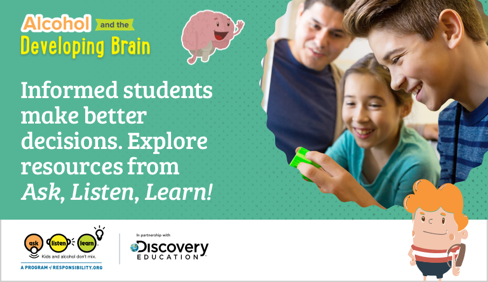Digital Resources to Spark Conversations About the Prevention of Underage Drinking

Parents are the leading influence on their kids’ decision to drink – or not to drink – alcohol. Research shows that since 2003 underage drinking has declined 50% and conversations between parents and their kids about alcohol have increased 73%.
While the parent-to-child conversations about saying “YES” to a healthy lifestyle and “NO” to underage drinking are essential, it can sometimes be difficult to know where to start. Ask, Listen, Learn in partnership with Discovery Education offers no-cost, digital resources for families to take a skills-based approach to teaching kids about communication, decision-making, and self-advocacy. These innovative, science and evidence-based resources for families, teachers, counselors, and school nurses teach kids about alcohol’s impact on the developing brain, body, and behavior, while also getting the conversation going with tips to keep the lines of communication open:
Ask, Listen, Learn Digital Exploration
In this interactive and self-paced module, students can learn about the effects of alcohol on the developing brain and use this information to help themselves (and friends!) make informed and responsible decisions when confronted with peer pressure to drink alcohol underage.
Digital Exploration Family Activity
In this activity students will react to scenarios related to underage drinking with a refusal strategy, an acceptance of a positive alternative, or a strategy to keep friends from making unhealthy choices.
Ask, Listen, Learn Family Infographic
Learn key tips and tricks for how to start, and keep, the chat going about saying “NO” to underage drinking.
Ask, Listen, Learn: Kids and Alcohol Don’t Mix
Access videos, lesson plans, games, and other science-based resources available from the most widely distributed underage drinking program of its kind. Ask, Listen, Learn: Kids and Alcohol Don’t Mix is a program of Responsibility.org.
In addition to having regular conversations with your kids about the prevention of underage drinking, you can help them learn to recognize signals that indicate underage drinking may take place (or may be taking place). Empower kids with the awareness to help avoid or remove themselves from dangerous situations by engaging in regular and open conversations at home, including reminding them that underage drinking is both risky and illegal behavior. Opening the lines of communication will help you support your kids in learning why they should say “NO” to underage drinking and how they can do so effectively.

